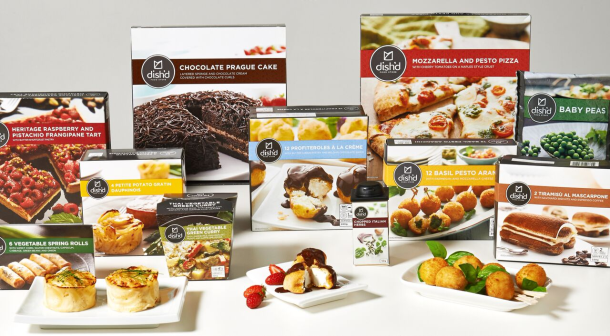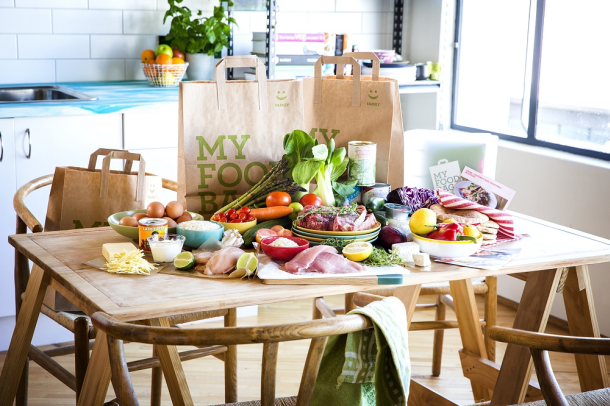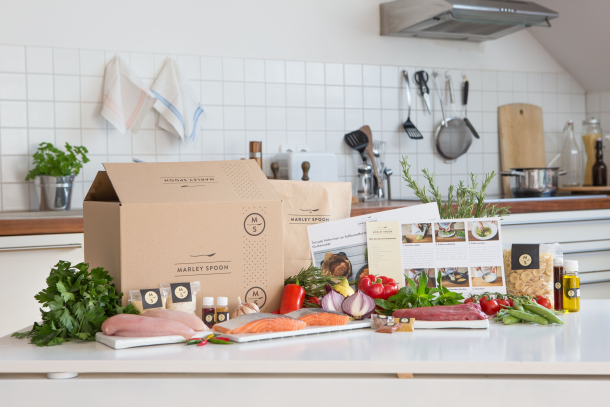The ready meals category now includes a rapidly evolving category of web-based make-at-home meal kit services. Alison Leader takes a look at four startups in the space that are bypassing traditional retail channels.
In recent years we've seen a ramp-up of home delivery offerings from the grocery chains, from fresh produce suppliers such as Aussie Farmers Direct and Farm Fresh Grocer, and from diet solutions companies like Lite and Easy, 5.4 and DietLicious.
But demand has also increased for home-delivered meals that are well-balanced and prepared by chefs – or portioned out with recipes attached so you can cook the meal yourself.
We investigate four of the fastest movers in the meal solutions space – Dish'd, My Food Bag, Hello Fresh, and Marley Spoon, and explore their potential to take a bite out of traditional retail and food service revenues.
Dish’d does ‘gourmet frozen’
Simplot Australia launched Dish’d – an online food store offering direct meal solutions to residents of Melbourne and Sydney – last year. Its point of difference to supermarket frozen meals is that its food is designed and prepared by culinary experts from scratch, using high-quality ingredients before being snap-frozen.
Dish'd also offers a range of meal components such as grass-fed beef, Atlantic salmon fillets and Australian-grown baby peas. Consumers shop the menu online, which includes a number of premium, imported products, then receive next-day delivery of their ready-to-heat meal, packed in dry ice. The meals can be used for entertaining, or for filling the blanks in a busy week.
Dish'd is designed for professional, educated people who are time-poor but want to eat well. The meals are not diet-orientated but are considered healthy, tasty, and convenient.

Comet Line Consulting director David Baveystock believes the direct meal solutions category competes with takeaway food options, with an average price point between $10 and $12 per meal.
“You're doubling the price of a Lean Cuisine from Woolworths and Coles and appealing to the consumer who wants a premium home-cooked meal delivered to their door,” he says.
Baveystock finds it interesting that Simplot is very strong in the retail frozen meal segment, but has created an imported offering that's bypassing the retailer.
“There is an element of linking the product to the provenance of the country, with desserts from France, pasta from Italy, and so on,” he says.
“It creates a point of difference to pull food from its country of origin, but the potential downside is that many people are trying to support local produce."
UK-based food marketing professor and international speaker David Hughes says retailers are also responding to consumer demand for clearly labelled meal components.
“The old-fashioned idea of buying ingredients and putting a meal together has been replaced by bolting together meal components.
“In Tescos in the UK for example, you can easily package together a side, main, dessert and bottle of wine for £10 ($18),” he shares.
Hughes also points to a noticeable convergence of food retail and food service.
“Retail wants that share of the stomach that restaurants have, and restaurants are getting back at retail and announcing home delivery. The gap is definitely closing between what food service offers and what retail offers.”
Home delivery in the bag
My Food Bag, which appointed former Saatchi & Saatchi boss Kevin Roberts to head it up earlier this year, is another rising star in the home delivery game. It's turned over $50 million since its launch two years ago, according to the company.
“I love My Food Bag’s customer-first model and am stoked to be on board,” Roberts said upon joining.
Customers can go online and order from three different styles of dinner kits which hold the ingredients and recipes for a week’s main meals. The meals arrive every week or every fortnight within a two hour window.
The service first launched in New Zealand in March 2013, and its farm-to-plate approach now attracts over 15,000 customers in Australia and New Zealand.
The recipes use fresh, seasonal produce and locally sourced ingredients, and nothing is frozen. Free-range and sustainably farmed products are provided where possible. The recipes have been developed by a head chef and dietitian, alongside a test kitchen team including celebrity chef Miguel Maestre.
The service is currently available in Australia in Sydney and Melbourne, with expansion to further cities planned for later this year.
The three food bag choices cater to a family with hungry teenagers (Classic), fussy little eaters (Family), or a couple of gourmet foodies (Gourmet), and the price ranges from $6.76 to $18.62 per plate.
All the recipes are at an easy to intermediate level, taking an average of 30 minutes to cook.

Fresh solutions
Australia’s Hello Fresh, which originated in the UK, is similar to My Food Bag in that customers cook the meal themselves rather than heating up something pre-prepared and frozen.
Recipes are created by chefs and the meals are meant to be well-balanced and easy to prepare. The aim of the service is to save the consumer time at the supermarket while inspiring them with cooking ideas.
All the ingredients are pre-measured and matched to several different recipes, depending on how many days of the week the customer chooses to receive their meal packs. Every week offers a different, fresh selection, which Hello Fresh chooses depending on the number of people eating.
A more recent entrant from Germany, Marley Spoon, also promises restaurant quality meals at home, so far in Sydney. It features recipes from Olivia Andrews, the woman in the behind-the-scenes kitchens of MasterChef, Recipe to Riches and Ready Steady Cook.
The company says it works directly with producers to deliver ingredients that are fresher than you are likely to find in the supermarket. It changes its recipes weekly, and gives customers the ability to choose the recipes they like most, sending them the exact quantities needed to create their meals, which also saves the time and the waste associated with traditional weekly grocery shops and other food delivery services.
Backed by the co-founder of Delivery Hero Fabian Siegel, Marley Spoon says it operates like the "Netflix of cooking", allowing you to manage your account online but enjoy the spoils in real time.
Baveystock says the My Food Bag, Marley Spoon and Hello Fresh concepts are based on a global phenomenon that started in Sweden in 2007.
“There are a lot of global start-ups moving into this market,” says Baveystock. “The appeal for this product is that compared to reheating a frozen meal, there's a bit more interaction in cooking the product. It's aimed at the consumer who wants the convenience of having pre-portioned ingredients delivered to the door with the recipe, allowing them to participate in meal preparation.”
These options also take out the step of going to the supermarket, list in hand, with a menu selection in mind.
“Many customers are claiming it is not necessarily more expensive than if they'd visited the store, and there's an experimental element which allows them to learn more about cooking and try out new recipes,” Baveystock says.
However, financially, it's still a bit of an unproven model, he says.
“Analysts overseas are all debating at what point these might become profitable business models. Like any startups, they will need scale to deliver a high level of profitability, and this may be close, or it may be years away.”

Chilled drinks in 40 mins or less
In the beverage space, a home delivery service for wine, beer and spirits is taking on Australia's bottle shops with its fast, cheap offering.
Called QuickBottle, the wine wholesaler has an online platform where consumers can choose from a full bottle shop range of alcohol which is then delivered to them, chilled, within 40 minutes.

Its founder Marc Chris says it keeps its prices competitive by passing the benefits of high-volume turnover to clients, with the team working hard to match or beat bottle shop prices.
QuickBottle currently services Sydney, and has plans to expand into Melbourne and Brisbane in the near future.









